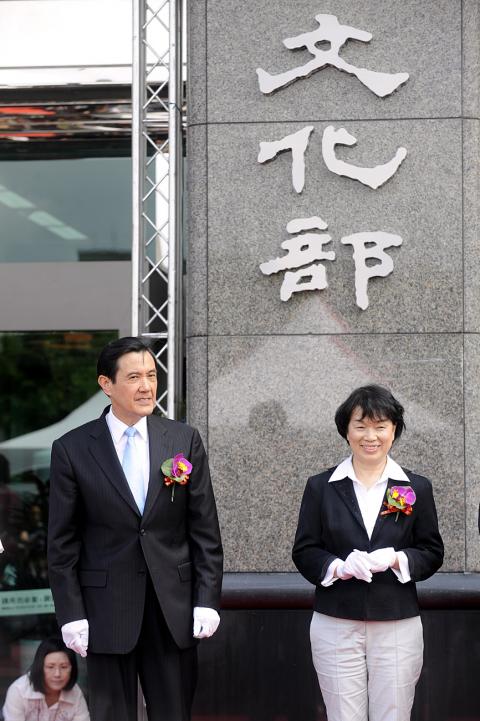Minister of Culture Lung Ying-tai (龍應台) yesterday said she hoped that cultural policies would be served by politics rather than serve political purposes.
Speaking at the inauguration of the new Ministry of Culture, which was attended by President Ma Ying-jeou (馬英九) and Premier Sean Chen (陳冲), Lung said she hoped that over the next four years, “culture will not serve politics, but will be served by politics.”
Lung expressed hope that cultural officials could be independent, knowledgeable, have an international perspective and a will of their own.

Photo: Sean Chao, Taipei Times)
“Ruling parties can come and go,” Lung said, but if cultural officials are independent-minded, they could withstand political influence and carry out cultural work to the benefit of the country.
Lung said if culture can permeate the central government’s policymaking decisions and play important roles in Taiwan’s education, foreign relations, economic and industrial policies, “then Taiwan will really be able to bring into full play its cultural advantages.”
She compared the establishment of the new ministry, which she described as “the project of the century,” to a relay race, saying that it is the cultural sector’s many years of efforts that have made the ministry possible.
In response, Ma said in a speech that if politics is a “fence,” then culture is “the pair of wings that fly over the fence.”
“Construction work can make a city larger, but only culture can make a city great,” Ma said.
He echoed Lung’s remarks about political interference in cultural affairs, saying that while culture agencies have served political purposes in the past, he would try to turn that around.
He said he hoped to provide more resources for the ministry in the future and that he expected the establishment of the ministry would spread “Chinese culture with Taiwanese characteristics” around Taiwan and the world.
The ministry was upgraded from the Council for Cultural Affairs after a Cabinet reorganization took effect on Sunday, and took over some responsibilities from the Ministry of Education, the now-defunct Government Information Office (GIO) and the Research, Development and Evaluation Commission.
George Hsu (許秋煌), a former deputy minister of the GIO, assumed office as the administrative deputy culture minister, while Chang Yun-cheng (張雲程) and Lin Chin-tien (林金田) were appointed political deputy ministers.
The ministry’s seven departments and two bureaus are tasked with general policy planning, fostering international cultural exchanges, development of the arts, the publishing industry, the cultural and creative industry, cultural resources and film, television and popular music, as well as protecting the country’s cultural assets.
Several people from the arts and culture sector attended the ceremony, including poet Chou Meng-tieh (周夢蝶), director Li Hsing (李行) and singer Lo Ta-yu (羅大佑).

Taiwan has received more than US$70 million in royalties as of the end of last year from developing the F-16V jet as countries worldwide purchase or upgrade to this popular model, government and military officials said on Saturday. Taiwan funded the development of the F-16V jet and ended up the sole investor as other countries withdrew from the program. Now the F-16V is increasingly popular and countries must pay Taiwan a percentage in royalties when they purchase new F-16V aircraft or upgrade older F-16 models. The next five years are expected to be the peak for these royalties, with Taiwan potentially earning

STAY IN YOUR LANE: As the US and Israel attack Iran, the ministry has warned China not to overstep by including Taiwanese citizens in its evacuation orders The Ministry of Foreign Affairs (MOFA) yesterday rebuked a statement by China’s embassy in Israel that it would evacuate Taiwanese holders of Chinese travel documents from Israel amid the latter’s escalating conflict with Iran. Tensions have risen across the Middle East in the wake of US and Israeli airstrikes on Iran beginning Saturday. China subsequently issued an evacuation notice for its citizens. In a news release, the Chinese embassy in Israel said holders of “Taiwan compatriot permits (台胞證)” issued to Taiwanese nationals by Chinese authorities for travel to China — could register for evacuation to Egypt. In Taipei, the ministry yesterday said Taiwan

Taiwan is awaiting official notification from the US regarding the status of the Agreement on Reciprocal Trade (ART) after the US Supreme Court ruled US President Donald Trump's global tariffs unconstitutional. Speaking to reporters before a legislative hearing today, Premier Cho Jung-tai (卓榮泰) said that Taiwan's negotiation team remains focused on ensuring that the bilateral trade deal remains intact despite the legal challenge to Trump's tariff policy. "The US has pledged to notify its trade partners once the subsequent administrative and legal processes are finalized, and that certainly includes Taiwan," Cho said when asked about opposition parties’ doubts that the ART was

If China chose to invade Taiwan tomorrow, it would only have to sever three undersea fiber-optic cable clusters to cause a data blackout, Jason Hsu (許毓仁), a senior fellow at the Hudson Institute and former Chinese Nationalist Party (KMT) legislator, told a US security panel yesterday. In a Taiwan contingency, cable disruption would be one of the earliest preinvasion actions and the signal that escalation had begun, he said, adding that Taiwan’s current cable repair capabilities are insufficient. The US-China Economic and Security Review Commission (USCC) yesterday held a hearing on US-China Competition Under the Sea, with Hsu speaking on